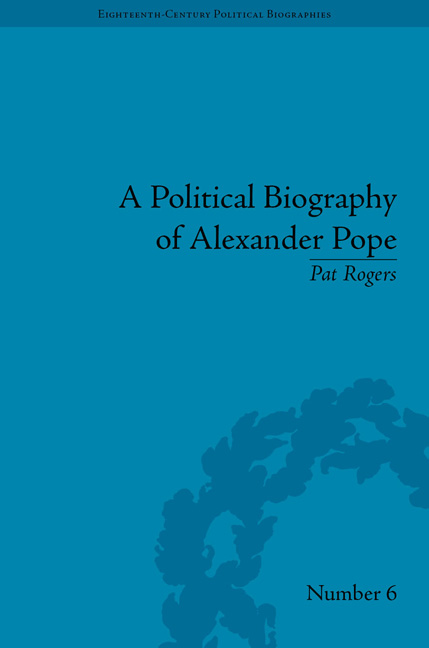Book contents
- Frontmatter
- CONTENTS
- Dedication
- Acknowledgements
- Abbreviations
- Dates and Quotations
- Sources
- Introduction
- Part I William and Anne, 1688–1714
- 1 Nature and Nurture
- 2 The Flowers of the Forest
- 3 The Piping Time of Peace
- Part II George I, 1714–27
- Part III George II, 1727–44
- Epilogue: After Walpole
- Notes
- Works Cited
- Index
1 - Nature and Nurture
from Part I - William and Anne, 1688–1714
- Frontmatter
- CONTENTS
- Dedication
- Acknowledgements
- Abbreviations
- Dates and Quotations
- Sources
- Introduction
- Part I William and Anne, 1688–1714
- 1 Nature and Nurture
- 2 The Flowers of the Forest
- 3 The Piping Time of Peace
- Part II George I, 1714–27
- Part III George II, 1727–44
- Epilogue: After Walpole
- Notes
- Works Cited
- Index
Summary
Like most of us, Alexander Pope was formed both by his family and by a broader environment. His genetic inheritance, as the child of quite elderly parents, merged with the effects of his upbringing, which took place first in the heart of London, then briefly in the outlying village (as it then was) of Hammersmith, and finally in the rural seclusion of Windsor Forest. Over the years the young man joined a set of wider communities, each of which had its own particular religious, social and geographic base. These separate influences combined to make him by the age of twenty-five essentially the man he would remain. Equally they contributed a great deal to the character of his poetry, and to the nature of the writer that he ultimately became.
1
Unspotted Names! and memorable long,
If there be Force in Virtue, or in Song.
Of gentle Blood (part shed in Honour's Cause,
While yet in Britain Honour had Applause) Each Parent sprung.
Epistle to Arbuthnot (TE, vol. 4, p. 126)Once upon a time – it now seems very distant – people generally cared more about the obligations of children than the responsibilities of parents. As a dutiful son, Alexander Pope felt a strong sense of filial respect. His lifelong behaviour shows that he loved his father and mother, and strove to be a proud and worthy offspring. On the face of things they were ordinary enough, and they certainly could not have anticipated that their child would make such a mark in the world. From his father, the younger Pope took not just his name but a deep commitment to the values of the principled recusant community, who were forced to give up so much because of their loyalty to their Catholic faith. We know less of his mother, and since she lived her days entirely in the domestic sphere it is likely that she embodied for Alexander qualities of Christian charity, homely virtue and simple piety.
- Type
- Chapter
- Information
- A Political Biography of Alexander Pope , pp. 7 - 28Publisher: Pickering & ChattoFirst published in: 2014



